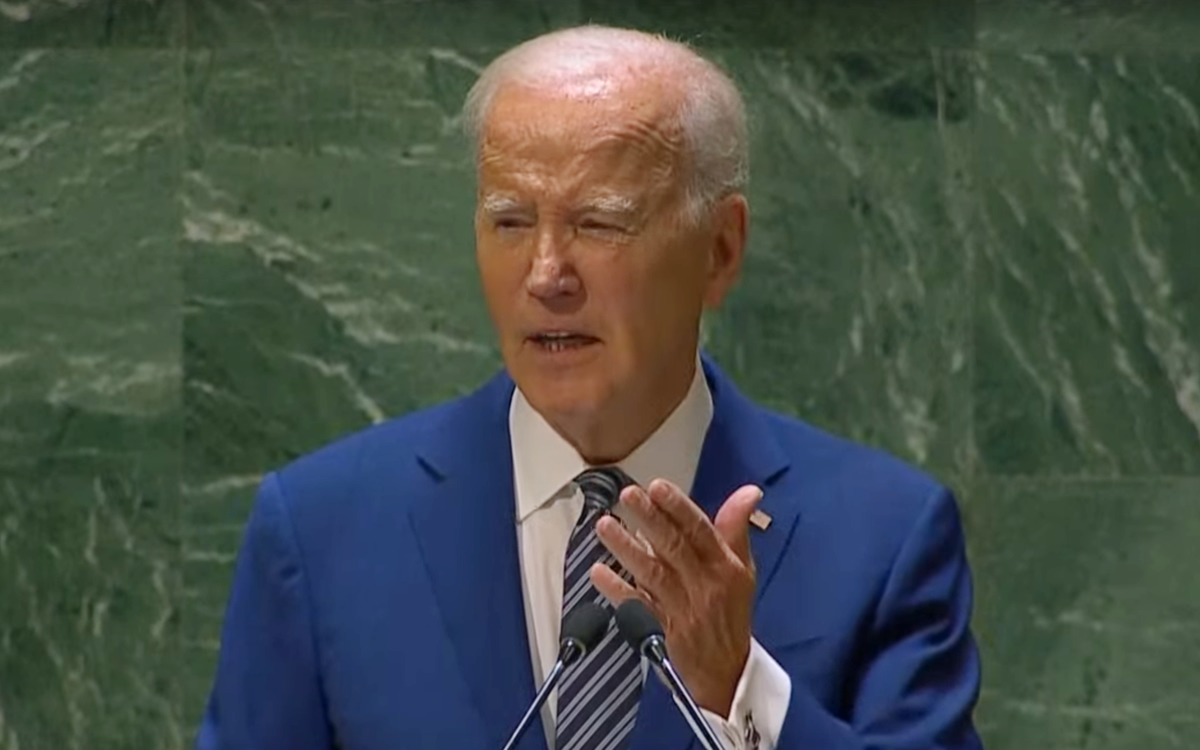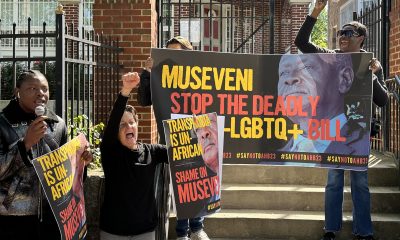United Nations
Biden references LGBTQ, intersex rights in UN General Assembly speech
‘We cannot turn away from abuses’

President Joe Biden on Tuesday noted LGBTQ and intersex rights in his speech to the U.N. General Assembly.
“We cannot turn away from abuses, whether in Xinjiang, Tehran, Darfur or anywhere else. We have to continue working to ensure that women and girls enjoy equal rights and equal participation in their society; that indigenous groups, racial, ethnic, religious minorities, people with disabilities do not have their potential stifled by systemic discrimination, that the LGBTQI+ people are not prosecuted or targeted with violence because of who they are,” said Biden. “These rights are part of our shared humanity. When they’re absent anywhere, their loss is felt everywhere. They are essential in the advancement of human progress that brings us together.”
Biden in 2021 signed a memo that committed the U.S. to promoting LGBTQ and intersex rights abroad as part of his administration’s overall foreign policy.
The General Assembly is taking place less than five months after Ugandan President Yoweri Museveni signed his country’s Anti-Homosexuality Act, which contains a death penalty provision for “aggravated homosexuality.”
The U.S. in June imposed visa restrictions on Ugandan officials. The World Bank Group last month announced the suspension of new loans to Uganda.
Biden in 2022 reiterated his administration’s commitment to LGBTQ and intersex rights abroad in his General Assembly speech.
U.S. Ambassador to the U.N. Linda Thomas-Greenfield earlier this year chaired a U.N. meeting that focused on the integration of LGBTQ and intersex rights into the U.N. Security Council’s work.
The U.S. is among the dozens of countries that are members of the U.N. LGBTI Core Group, a group of U.N. countries that have pledged to support LGBTQ and intersex rights. California Congresswoman Barbara Lee and openly gay Irish Prime Minister Leo Varadkar are among those who spoke at an event on Monday on the sidelines of the General Assembly that commemorated the group’s 15th anniversary.
PEPFAR has saved more than 25 million lives
Biden in his speech also highlighted the President’s Emergency Plan for AIDS Relief.
“HIV/AIDS infections and deaths plummeted in no small part because of PEPFAR’s work in more than 55 countries, saving more than 25 million lives,” he said.
American officials earlier this year postponed a meeting on PEPFAR’s work in Uganda in order to assess the Anti-Homosexuality Act’s potential impact on it.
U.S. Capitol Police on Sept. 11 arrested seven HIV/AIDS activists who refused to leave House Speaker Kevin McCarthy (R-Calif.)’s office in the Rayburn House Office Building. Housing Works CEO Charles King, Housing Works President Matthew Bernardo and Health GAP Executive Director Asia Russell are among those who demanded the California Republican to reauthorize PEPFAR.
Ukraine, climate change and democracy are three of the other issues that Biden noted in his General Assembly speech.
United Nations
Trump pulls Elise Stefanik’s UN ambassador nomination
Republicans have slim majority in US House of Representatives

President Donald Trump on Thursday withdrew U.S. Rep. Elise Stefanik (R-N.Y.)’s nomination to become the next U.S. ambassador to the U.N.
The Associated Press noted Trump in a Truth Social post said it was “essential to maintain every Republican seat in Congress.”
Republicans currently have a narrow 218-213 majority in the U.S. House of Representatives. Special elections to fill the seats that National Security Adviser Mike Waltz and former U.S. Rep. Matt Gaetz (R-Fla.) vacated when they joined the Trump-Vance administration and resigned respectively will take place on April 1 in Florida.
“Elise Stefanik is truly a great leader and a devoted patriot,” said House Speaker Mike Johnson (R-La.) in a statement. “Today’s selfless decision shows America what those of us who work with her already know. She is deeply devoted to her country and fully committed to see President Trump’s agenda succeed in Congress.”
“It is well known Republicans have a razor-thin House majority, and Elise’s agreement to withdraw her nomination will allow us to keep one of the toughest, most resolute members of our conference in place to help drive forward President Trump’s America First policies,” he added. “There is no doubt she would have served with distinction as our ambassador to the United Nations, but we are grateful for her willingness to sacrifice that position and remain in Congress to help us save the country.”
Stefanik, 40, has represented New York’s 21st Congressional District since 2015. She later became chair of the House Republican Conference.
Stefanik in 2019 voted for the Equality Act, but she opposed it in 2021. Stefanik in 2022 is among the dozens of Republicans who voted for the Respect for Marriage Act that then-President Joe Biden signed.
Stefanik, among other things, has also been outspoken against antisemitism on college campuses.
Trump has not said who he will nominate to become U.N. ambassador. Johnson in his statement said he will “invite her to return to the leadership table” of the House Republican Conference “immediately.”
United Nations
US withdraws from UN LGBTI Core Group
State Department: Decision ‘in line with the president’s recent executive orders’

The U.S. has withdrawn from a group of U.N. member states that have pledged to support LGBTQ and intersex rights.
The U.N. LGBTI Core Group formed in 2008.
Chile and the Netherlands are the current co-chairs. Albania, Argentina, Australia, Belgium, Bolivia, Brazil, Cabo Verde, Canada, Colombia, Costa Rica, Croatia, Denmark, the Dominican Republic, Ecuador, Finland, France, Germany, Honduras, Iceland, Ireland, Israel, Italy, Japan, Luxembourg, Malta, Mexico, Montenegro, Nepal, Peru, New Zealand, North Macedonia, Norway, Portugal, South Africa, Spain, Sweden, Timor Leste, the U.K., and Uruguay are members.
The EU, the U.N. High Commissioner for Human Rights, Human Rights Watch and Outright International are observers.
“The overarching goal of the UN LGBTI Core Group in New York is to work within the United Nations framework on ensuring universal respect for the human rights and fundamental freedoms for all, specifically lesbian, gay bisexual, transgender, and intersex (LGBTI) persons, with a particular focus on protection from violence and discrimination,” states the Core Group’s website.
The Core Group also has three specific objectives:
• Raising awareness about LGBTI issues
• Contributing to multilateral work and negotiations at the United Nations
• Seeking common ground and engaging in a spirit of open, respectful and constructive dialogue and cooperation with UN member states and other stakeholders outside the Core Group.
The promotion of LGBTQ and intersex rights were a cornerstone of the Biden-Harris administration’s foreign policy.
Former first lady Jill Biden last September spoke at a Core Group event that took place on the sidelines of the U.N. General Assembly. Former President Joe Biden was vice president in 2016 when he spoke at a Core Group event that coincided with that year’s U.N. General Assembly.
President Donald Trump since he took office on Jan. 20 has signed a number of executive orders that have targeted the LGBTQ and intersex community. These include the “Defending Women from Gender Ideology Extremism and Restoring Biological Truth to the Federal Government” directive that, among other things, bans the State Department from issuing passports with “X” gender markers.
A directive that Secretary of State Marco Rubio issued bans embassies and other U.S. diplomatic institutions from flying the Pride flag. (Joe Biden in March 2024 signed a government spending bill with a provision that banned Pride flags from flying over U.S. embassies.)
The Associated Press last week reported the Trump-Vance administration has terminated 90 percent of the U.S. Agency for International Development’s foreign aid contracts. Activists with whom the Washington Blade has spoken in previous weeks say the White House’s decision to freeze nearly all U.S. foreign aid spending has been “catastrophic” for the global LGBTQ and intersex rights movement.
A source told the Blade the U.S. withdrew from the Core Group on Feb. 14. A State Department spokesperson on Saturday confirmed the withdrawal, but did not specify the specific date.
“In line with the president’s recent executive orders, we have withdrawn from the U.N. LGBTI Core Group,” said the spokesperson.
United Nations
Elise Stefanik pledges to advance ‘America First’ agenda at UN
Senate Foreign Relations Committee held confirmation hearing on Tuesday

The Senate Foreign Relations Committee on Tuesday held U.S. Rep. Elise Stefanik (R-N.Y.)’s confirmation hearing to become the next U.S. ambassador to the U.N.
The New York Republican did not specifically discuss LGBTQ or intersex rights, but in her opening statement she said President Donald Trump after he nominated her “shared with me that he sees great promise in the United Nations if it focuses on its founding mission of international peace and security.”
“President Trump has long advocated for peace and no wars,” said Stefanik. “He delivered the Abraham Accords (the 2020 agreement in which Bahrain, the United Arab Emirates, and Morocco normalized relations with Israel), the largest step to regional peace in a quarter century.”
“If confirmed, I will work to ensure that our mission to the United Nations serves the interests of the American people and represents President Trump’s America First peace through strength foreign policy,” she added.

Stefanik, 40, has represented New York’s 21st Congressional District since 2015. She later became chair of the House Republican Conference.
Stefanik in 2019 voted for the Equality Act, but she opposed it in 2021. Stefanik in 2022 is among the dozens of Republicans who voted for the Respect for Marriage Act that then-President Joe Biden signed.
Stefanik, among other things, has also been outspoken against antisemitism on college campuses.
U.S. Sen. Dave McCormick (R-Pa.) on Tuesday asked Stefanik about what he described as antisemitism and “anti-Israel bias” at the U.N.
“If you look at the antisemitic rot within the United Nations, there are more resolutions targeting Israel than any other country, any other crisis, combined,” said Stefanik.
“We need to be a voice of moral clarity,” she added.
The hearing took place less than a day after the Senate confirmed Secretary of State Marco Rubio.
-

 District of Columbia4 days ago
District of Columbia4 days agoFinal push to raise funds, fill D.C. hotels as WorldPride nears
-

 District of Columbia4 days ago
District of Columbia4 days agoReenactment of 1965 gay rights protest at White House set for April 17
-

 Maryland4 days ago
Maryland4 days agoFreeState Justice: Transgender activist ‘hijacked’ Moore’s Transgender Day of Visibility event
-

 El Salvador2 days ago
El Salvador2 days agoGay Venezuelan makeup artist remains in El Salvador mega prison












